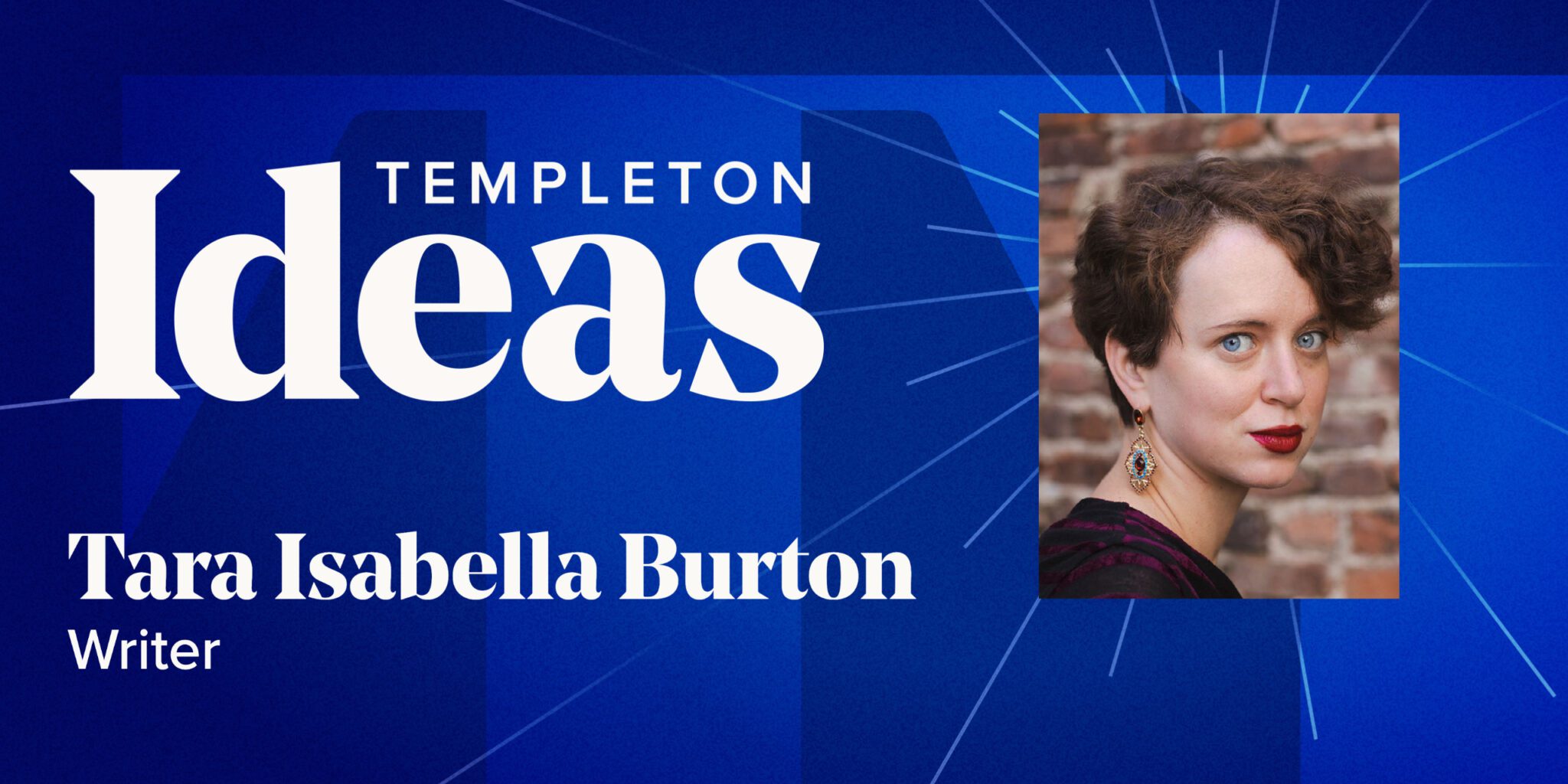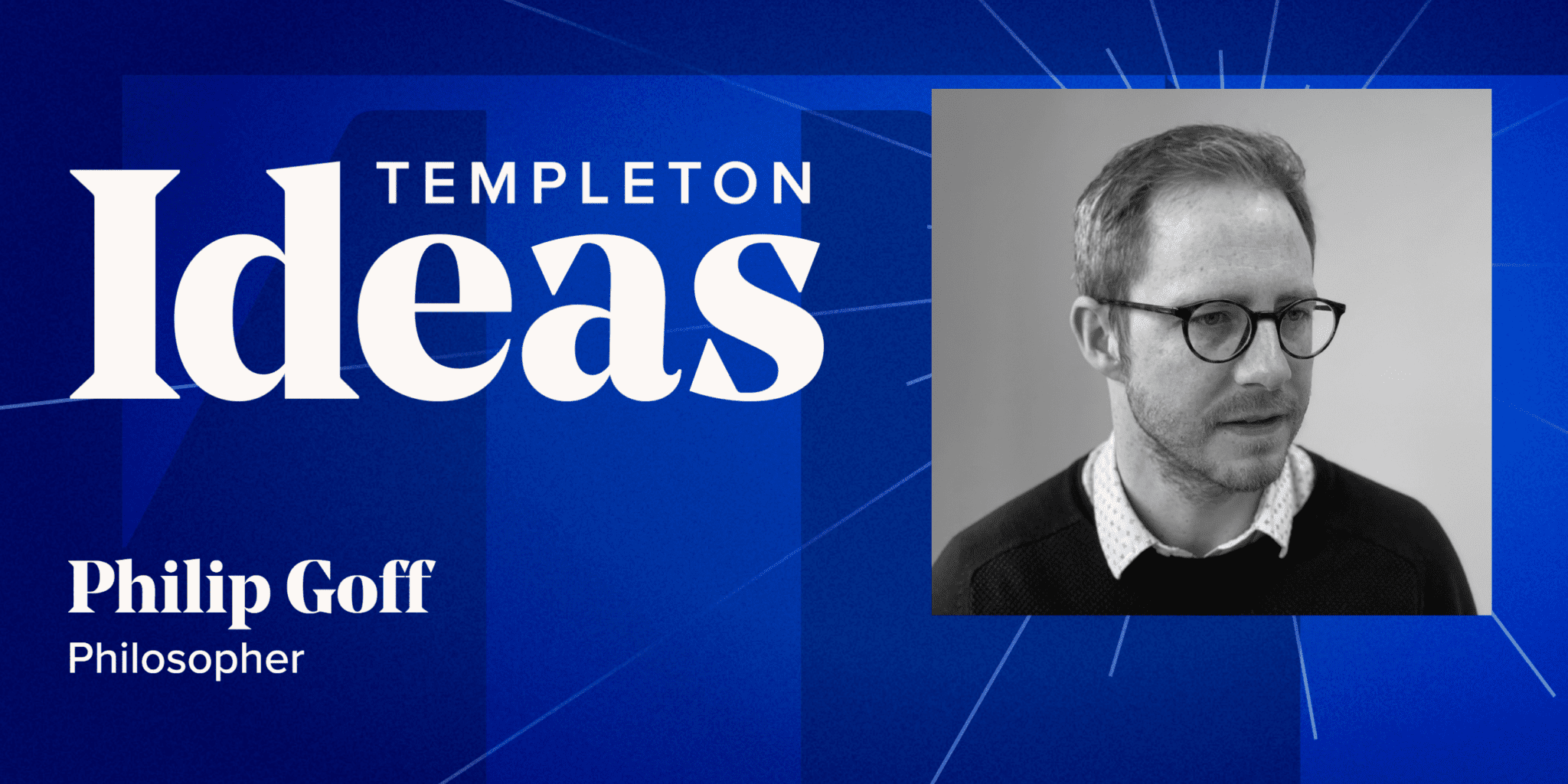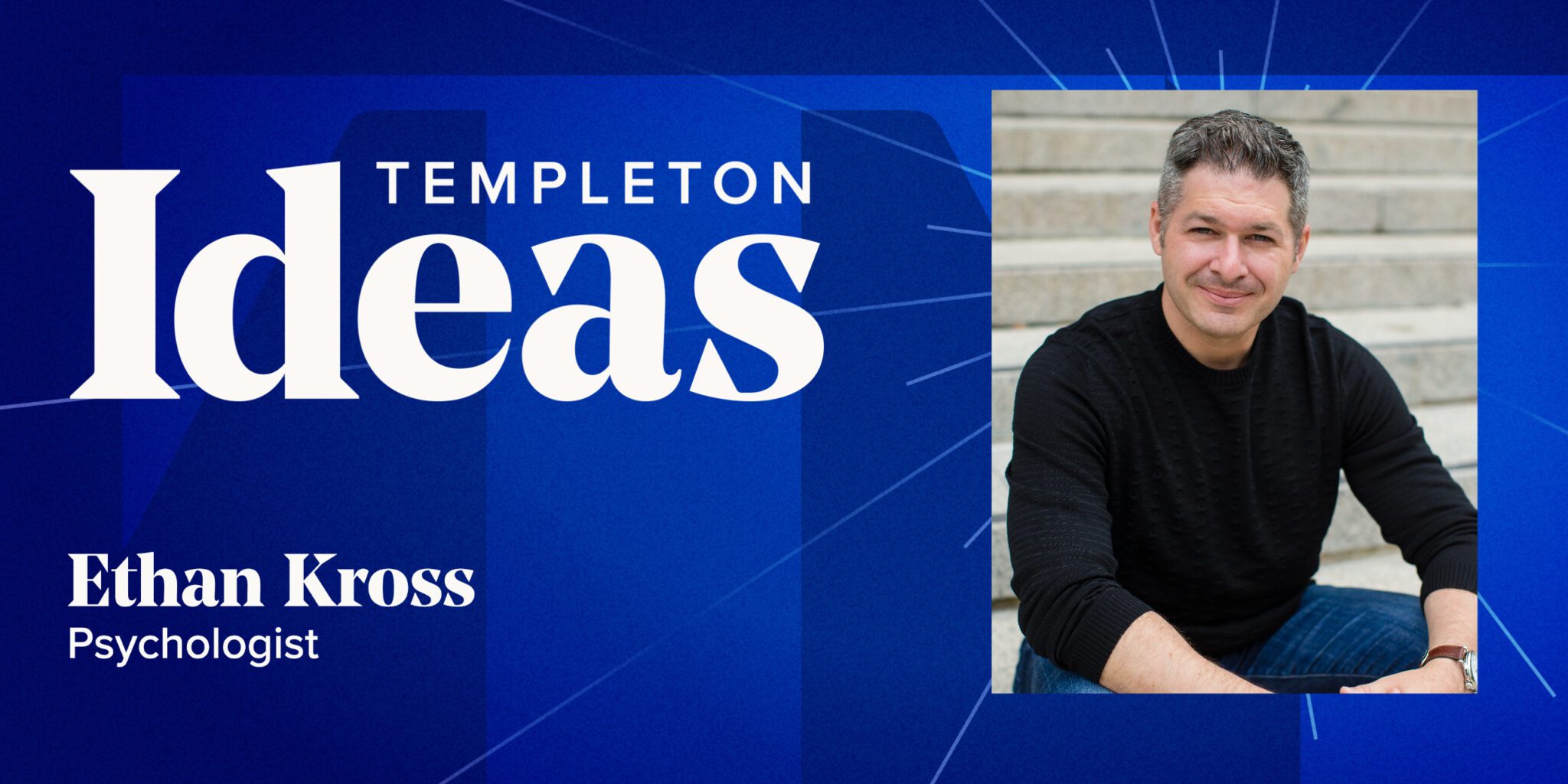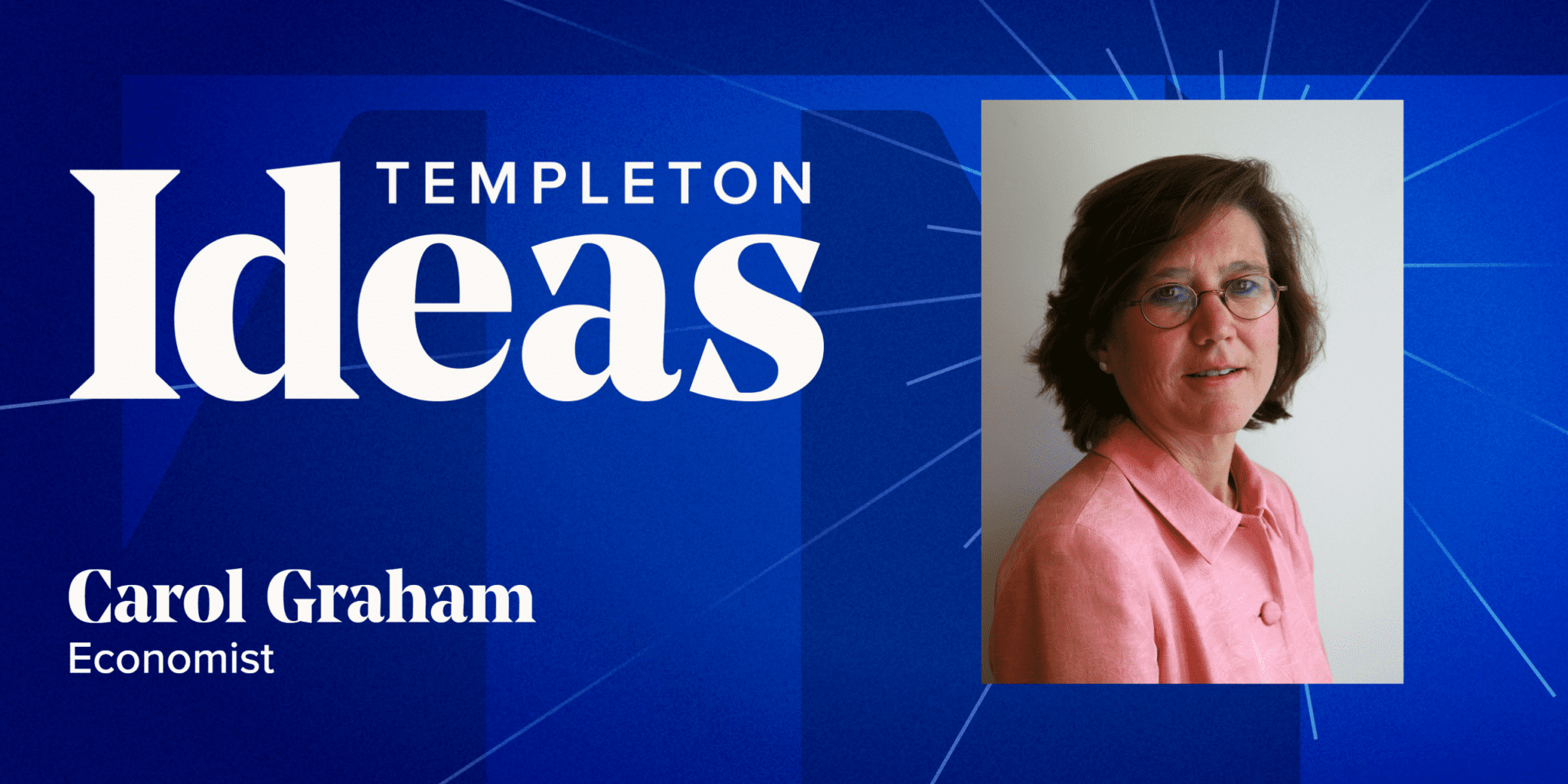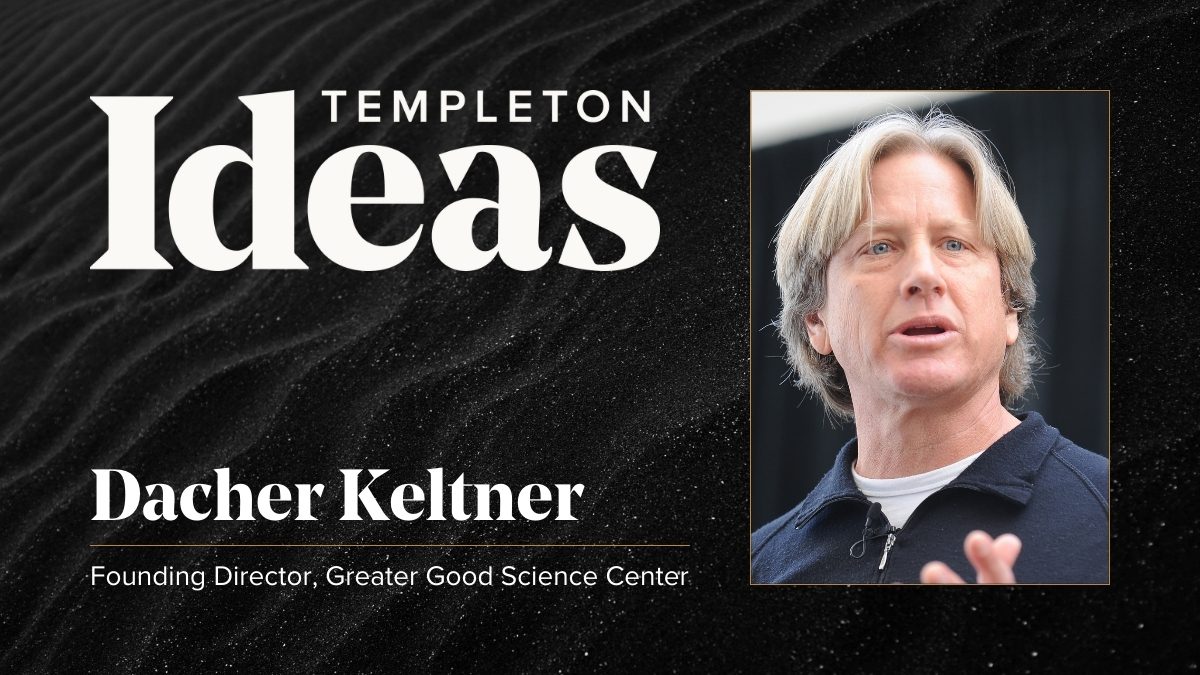The Templeton Ideas Podcast is a show about the most awe-inspiring ideas in our world and the people who investigate them.
Dr. Tara Isabella Burton is an author of both fiction and nonfiction, whose works have appeared in National Geographic, The New York Times, The Washington Post, and more. Her new book Self-Made: Curating Our Image from Da Vinci to the Kardashians explores self-makers throughout history who’ve set themselves apart from conventional society, from Renaissance geniuses to Instagram stars. Tara received her doctorate in theology from Oxford in 2017. Tara joins the podcast to discuss self-making in contemporary society, the definition of dandyism, and the mysterious “it factor” associated with both modern and historical celebrities.
Transcripts of our episodes are made available as soon as possible. They are not fully edited for grammar or spelling.
Tom: Tara, welcome to the podcast.
Tara: Thank you so much for having me on. I’m delighted to be here.
Tom: I’d love to start off by asking you a few personal questions, starting with some of your earliest memories. Where did you grow up, and what are some of the passions you had as a child?
Tara: Sure, so the where did I grow up question, the answer is sort of, it’s complicated. Mostly New York City. My father’s Italian, my mother’s American.
They did not stay together, but I grew up sort of mostly in New York with a bit of Paris, a bit of Rome, a bit of all over, and then all of my undergraduate and graduate education was in England. And now my father and my mother, though. Still not together, my mother has now retired to Italy, so my entire family, including half-sister, cousins, everyone is in a different part of Italy, so simultaneously I’m a born-and-raised New Yorker whose entire family is abroad.
Tom: What were the key passions you had as a child? What are the things that you just loved to do more than anything?
Tara: So my passions have not changed at all. When I was about 12 years old, I read Oscar Wilde for the first time, Picture of Dorian Gray got really, really into aestheticism, catholicism, and the relationship between the two in what I am sure now in retrospect was an extremely annoying theater kid way and that led me to an interest in 19th century French decadence to the point where when I applied to do a theology degree at Oxford I was by no means the only weird theater kid that I knew that really liked Oscar Wilde, but probably going to pilgrimages with lilies to Oscar Wilde’s grave I now recognize perhaps was a bit excessive.
Tom: We’re going to talk about your new book, Self-Made, in great detail coming up, but I want to ask you in the spirit of self-making, what are some of the kind of defining moments in your life that helped you kind of shape what your identity is and how you see yourself?
Tara: I will say that I think something that really struck me as someone who grew up deeply, deeply nomadic and in a very Bohemian household.
One year it was Paris, the next it would be Rome, I’d be homeschooled here, homeschooled there. As a rebellious teenager, it’s very hard to rebel against Bohemia. There was a time, particularly in the nine years I spent in England studying theology, where… I was very drawn to something much more stable. I really came to practicing faith in New York, contending with my time at Oxford in a new way.
I was seeing with new eyes the kind of rootedness that faith practice offered. I studied theology for nine years at Oxford, a place with some of the most beautiful churches and some of the most extraordinary church music in the world and was not a practicing Christian. And as soon as I left it immediately became an Anglo Catholic.
For me, it’s very much about recognizing in the city, a place where there is both beauty and art and perhaps even artifice alongside a sense of rootedness and community. And I think often these things are held in opposition, that there’s this idea that the city is Babylon, it’s the Moulin Rouge, and then there’s this sort of other, purer place, the small town, the hometown, that is simple and rooted. And so much of both my intellectual and personal interests have been about trying to find in the city a vision of rootedness that incorporates the best of what a metropolis can offer without being rootless.
Tom: Well, I wanna pivot now to Self-Made your new book, Creating Our Identities from Da Vinci to the Kardashians.
Tom: I wanna start by saying that I think your subtitle is perhaps the greatest subtitle that I have ever seen in a book. So kudos to you on that. It is, it just warmed my heart from the moment I saw it. I love the cover art, and in terms of judging a book by its cover, I just wanted to start flipping pages immediately.
Tara: My publishers absolutely deserve credit there was a part of me that wanted to call it from Albrecht Dürer to only fans, or from Albrecht Dürer to Caroline Calloway, but apparently neither of those are quite as recognizable or snappy. So I think the ‘Da Vinci to the Kardashians’ is pretty fair.
Tom: Where did the idea come from for this book?
Tara: I began thinking that something that I wanted to explore in greater detail was the sense of the religious element of self-creation in contemporary Instagram-saturated and particularly internet-saturated society. I was interested in a world in which an external authoritative god is not the arbiter of meaning.
What does that look like, and how does that tie into what I see as the certain kinds of spiritualities of the self, proliferating in the 21st century, but that are not exclusive to the 21st century? And that’s really what I wanted to explore in Self-Made. While… contextualizing it in this wider story of economic mobility, of images of those people who were set apart from conventional society by being self-makers from the Renaissance genius to the Regency dandy to the American self-made hustler of the Gilded Age.
All of these figures, in my mind, represent facets of the exploration of these.. these people who don’t quite fit. These people who get to choose their own destinies. And Self-Made became a cultural history of these figures that also, I hope, told a wider intellectual story about where we are today.
Tom: For our listeners that aren’t familiar with the term, what is a dandy?
I feel like this is something we should bring back into the vernacular, because I think they’re definitely here again.
Tara: There’s many definitions of dandyism. Precisely because early dandies like Beau Brummel were… avowedly into not being noticed, whose, you know, sartorial splendor was all meant to be very subtle.
But in terms of how we might understand dandyism today, someone who creates their life as a work of art and whose physical self-expression makes that evident in their daily life.
Tom: Would Oscar Wilde be somebody you’d look to as like an example of a dandy? I’m trying to think of any public figures that would be recognizable.
Tara: Absolutely, Oscar Wilde, who famously said that he put his talent into his work, but his genius into his life. He is the ultimate dandy.
Tom: That is a great quote.
Tom: This book covers a long history. I mean, going back to Da Vinci, Dürer, and brings us all the way up to the present. You covered a lot of terrain, and in your account, you talked about a lot of historical figures. And I wondered, as you were writing this book, was there a particular historical figure that you just found yourself falling in love with, rooting for, and just personally very attached to as you wrote?
Tara: Probably Montaigne. Um. I think he’s just really, really funny. There’s such a sort of joyful humanity to Montaigne, and I think a lot of the other self-makers, like someone like de Sade, for example, who’s often held up as this, like, sexy, exciting example of transgression, I found de Sade hard to write about.
I, I hate him. I hate his work. I had to force myself to kind of read some of his extremely graphic descriptions of, you know, torture and murder, squinting my eyes so that I didn’t see too many awful things would give me nightmares. But Montaigne, by contrast, of the sort of vaguely enlightenment adjacent, slightly transgressive writers, is someone whose humanity is full of joy.
Tom: For our listeners that aren’t familiar with Montaigne, who is this guy?
Tara: Michel de Montaigne, writing, uh, in the second half of the 16th century, uh, French philosopher best known for popularizing the essay. Some people will say he’s a father of the personal essay… that might be overdoing it. But what is sort of distinct about his work is the way that he really puts himself, his personality into each essay, so that he’s simultaneously writing about ideas and writing about himself, one particular person, exploring these ideas. And the relationship between the particular and the generic in his work has been enormously influential. Whatever I have to say about Instagram, whatever I have to say about the cult of authenticity being profoundly antisocial, what I don’t want to lose, and what I think, uh, Montaigne does a great job of not losing is a sense that there is something really sacred and just plain weird about each individual human being.
That like, nothing can be just weirder than another person. And I mean that with, with great love, if it doesn’t come across my voice. And I think holding onto that strangeness, holding onto that uniqueness, is a kind of moral dictate for anyone who wants to critique modern liberal cults of self-making, which I do.
Tom: After the break, we talk about the mysterious “it factor” associated with self-making and how historical celebrities compare to modern ones.
Abby: You’re listening to the Templeton Ideas Podcast from the John Templeton Foundation. If you’re enjoying this episode, check out templeton.org/news for more awe-inspiring perspectives from scholars, journalists, and colleagues. You can sign up there to get our newsletter in your inbox or follow us wherever you are on social media.
Abby: Now, let’s get back to our conversation.
Tom: I want to ask you about another celebrity in your book, the 19th century Hungarian pianist and composer Franz Liszt. Can you tell me what it would have been like for me to attend one of his public concerts in the 1840s?
Tara: Uh, probably… Have you ever been to a Taylor Swift concert?
Tom: I’ve seen a lot of TikTok videos, so I feel like I’ve been there before.
Tara: I could never get a ticket. I would love to go to a Taylor Swift concert. But from my understanding of people fortunate enough to see Taylor Swift live, a little bit like that.
Tara: Uh, imagine… People fainting and swooning and having, like, other quasi erotic reactions. I mean, Lisztomania was one of the first widespread celebrity obsessions. And it’s sort of unclear what it was about him. It wasn’t just his music. It was the way in which his music, his public persona, his appearance, all seem to come together to create this kind of vision of early, early celebrity.
I think Liszt is an example of this kind of very weird phenomena at the heart of celebrity culture that becomes more and more explicit, basically, the further we go into Hollywood and then into the post-Warhol era. So perhaps you’ve heard of “it”. The idea of “it” in old Hollywood. Like, that mysterious quality we can’t really define, that we don’t really understand that just makes some people stars.
And there’s versions of this language throughout the history of self-making. But whatever it is, Liszt had it. But what makes it interesting is that it is simultaneously understood as something that is innate. Which is to say, you have it or you don’t, and yet at the same time, it is also something you maybe kind of, sort of, can acquire.
It becomes to be understood that having “it” is about harnessing, having control over your you-ness. There’s a self-help course that gets advertised, in I want to say 1928, certainly around there, called Personal Magnetism. And the tagline for the course is ‘everybody has it, but only one person in a hundred or a million knows how to use it’.
Some people know how to take that uniqueness and like, make it pay, make it show. That combination of this thing is innate, but you can also harness it and therefore you can work for it, that really comes at the heart of, I think, modern celebrity, and also modern ideas of self-making.
Tom: As I was reading Self-Made, I saw some parallels to your previous book, Strange Rites, New Religions for a Godless World. Can you tell me just a little bit, how does the self-making movement relate to the current trends we have in people’s religious affiliations, their religious identity?
Tara: Sure. So, about a quarter of Americans, and that goes up significantly, the younger the population we’re looking at up to about 36%, uh, for young millennials and generation Z say that they’re religiously unaffiliated.
That doesn’t mean that they don’t believe in God or a higher power. It simply means they do not check the box for an organized religion as traditionally understood. And the more you look at the religiously unaffiliated, the spiritual but not religious, or people who identify as one religion but whose stated beliefs and preferences suggest something a little more eclectic, all of which I refer to in my book as the religiously remixed, you see a kind of common factor, which is the idea that by looking inwards to what resonates with them. The idea that like, this dogma, it doesn’t work for me, is what I’m gonna, I’m gonna take this other thing that does work for me. That the purpose of a religion, cobbled together, mixed and matched, is ultimately to solve a personal psychological need. Independent from any truth claims. And I think that this tendency is downstream of a much broader and more significant tendency to see the self as authoritative precisely because in a world without external authority or sort of metaphysical truth claims, the source of both moral authority and meaning-making is our own selves.
You see this, for example, in new thought in the 19th century. You see this in the 21st century with the rise of manifesting. It’s not just that, like, there’s no God and we can do what we want. It’s more, we are ourselves divine because that thing that is divinity is our own will. Our experience of will and of desire, in particular desire, is a kind of engine on which everything runs. I think this is more broadly true in our culture that we do see reality as something that is not fixed that we have to conform ourselves to, but something that we have the power, be it technological or spiritual to fix ourselves.
Tom: As far as turning the camera back on yourself. What did you learn about yourself, writing Self-Made?
Tara: It’s a lesson I learned about myself when my first novel came out that became more pertinent when Self-Made was coming out, which is I, like many young debut novelists in their 20s, was very open to being kind of public, and this was an era, especially like many female writers, I came of age writing personal essays because that’s what sold and I wanted to get my name out there, and I became aware at a certain point how much of my personal life felt commodified for the building of my personal brand to sell books.
And I hated it. And I also, I had a public Instagram. It was never, never had the kind of followers that any kind of like, influencer now would have. But I have some, some hobbies that involve me dressing up in certain ways. I collect vintage clothing. I’m interested in certain kinds of historical costume. All just personal hobbies. And I learned the hard way that when you have pictures of yourself in an 18th century dress, uh, on Instagram, that people who don’t know you might think that this is part of, kind of brand building when actually you just have a weird kind of dorky hobby. So I’ve become very, very wary of the conflation of personal brand building and sharing of personal photographs since then.
I don’t like the idea that my personal life, my romantic life, my family life, my sartorial choices are at all a part of my professional life. And that is something that I am very, very committed to, precisely because I have had the experience of not creating that separation strictly and not really enjoying the result or feeling that the things that I did once because I enjoyed them were now suddenly being done for reasons outside of enjoyment.
Tom: Looking forward, what makes you hopeful about the future?
Tara: I think that there is a backlash, especially among people younger, so I’m 32, so the Generation Z, people younger than me, who have lived their lives online, perhaps whose baby pictures have been content for their parents, who are wary of what this means, and while I don’t think this is, you know, the majority by any means, I think there’s a lot of people younger than me that are just so native to this technology that they don’t question it.
I think that there are enough people having grown up with social media will develop a suspicion of it as they reach their later teenage years and adulthood. So I do think certain tides will turn, when it comes to the idea that our lives are public, I think privacy increasingly will become a luxury good, especially as in the gig economy and the attention economy alike our personal brands are so tied up with not the joy of Wildian and Dandyism, but economic necessity. That the kind of aspiration will be to not have to put anything about one’s life on the internet at all.
Tom: Tara, thank you for talking to me today. I will never think of Franz Liszt in the same way again.
Tara: Thank you so much for having me.
Abby: You’ve been listening to Templeton Ideas from the John Templeton Foundation, where we fund research and tell stories that inspire people with awe and wonder. We’re proud to support leading scientists, philosophers, and theologians from around the world. Learn about the latest discoveries related to black holes, complexity, forgiveness, and free will at templeton.org/news. If you like what you’ve heard so far, follow us and leave us a review wherever you get your podcasts. Our program was produced by Jakob Lewis with Great Feeling Studios. Our theme song is by Dan Burns. Our staff includes Thomas Burnett, Abby Ponticello, Benjamin Carlson, David Nassar, Gerald Nelson, and Alyssa Settefrati.
